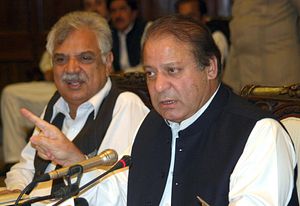In Pakistan, charges of corruption have in the past produced military coups, and for a combined 35 years of its history since 1958, the country has been ruled by military dictators. Following the revelations of the Panama Papers, in which three children of Pakistan Prime Minister Nawaz Sharif have been named, the prime minister is coming under increasing pressure. Pakistan Tehreek-i-Insaf (PTI) Chairman Imran Khan has once again begun calling for Nawaz Sharif to step down. While addressing a large crowd at Islamabad’s F9 Park, Khan announced an anti-corruption movement in Sindh and rally in Lahore. Before his speech, he vowed he would hold a sit-in outside the Raiwind residence of Nawaz Sharif.
For the Sharif government, what is perhaps most troubling is the recent statement of Pakistan’s army chief General Raheel Sharif, made during a visit to the Signal Regimental Centre in Kohat. The general had reportedly said that across-the-board accountability was necessary for the solidarity, integrity and prosperity of Pakistan, and emphasized the importance of rooting out corruption. He also said that the war against terror could not be won unless “the menace of corruption was uprooted.” For most of the critics of Pakistan’s security establishment, these statements by Pakistan’s top army officer were taken in the context of the Panama Papers. They argued that the words – which linked two different issues, terror and corruption – were aimed at increasing pressure on the Sharif government.
In the past, there has been a general perception in Pakistan that the military is immune to accountability and reproach, while politicians always have faced trials, and indeed have served jail sentences for corruption. When General Sharif vowed that “across-the-board accountability” was essential for Pakistan, many critics of the military establishment asked the question: Why doesn’t the army initiate transparent accountability measures against former and serving army officers, who have allegedly been involved in corruption.
Then, two days after the army chief’s statement, in an unprecedented move, the army decided to make public the punishment handed down to six senior army officers, including a lieutenant general, major general, three brigadiers, and a colonel, who had been implicated in corruption, including smuggling. Security analysts then took the view that the long-awaited move has placed significant pressure on the prime minister.
Already, Nawaz Sharif has twice addressed the nation on television in recent weeks. In his second televised speech, he spared nobody, targeting his political opponents, the “hostile” media, the regime of General Pervez Musharraf and his allies. However, he reserved most of his invective for the Pakistan Tehreek-i-Insaf and its chairman Imran Khan, labeling the former cricketer a power-hungry politician who was exploiting the issue of offshore companies to destabilize the country. In a nutshell, Sharif said he would resign if found guilty, but vehemently denied any wrongdoing and expressed his willingness to form a judicial commission.
Many observers felt that the prime minister’s speech was ill-advised. Analysts believe that it is imperative that Sharif now take transparent measures against his corrupt ministers and leaders belonging to his party, the Pakistan Muslim League-Nawaz (PML-N). They also argue that he should declare all of his family assets. Fail to do that, analysts argue, and the beleaguered prime minister may not survive this time.
In 2008, when democracy returned to Pakistan after eight years, it was thought that the army had been pushed into the background. During his tenure, former President Asif Ali Zardari of the Pakistan Peoples Party (PPP) showed considerable interest in improving relations with India, by setting aside the Kashmir issue over which Pakistan and India have fought three wars since 1947. However, the president was soon rebuffed by the then Chief of Army Staff General Ashfaq Pervez Kayani. Subsequently, after the killing of Osama bin Laden by American forces in 2011, the memogate controversy erupted. The former president was forced to backtrack on his diplomatic outreach.
Similarly, in 2013, Prime Minister Nawaz Sharif came to power with a strong mandate. He also sought to make his mark on Pakistan’s foreign policy, with talk of friendlier relations with neighbors, notably India and Afghanistan. As Sharif moved to assert himself in Pakistan’s foreign policy, Imran Khan and Muhammad Tahir-ul-Qadri, a Barelvi scholar who is chief of the Pakistan Awami Tehrik, held sit-ins in Islamabad in August 2014, which ran for 126 days. During the protest, their supporters not only ransacked Pakistan Television headquarters in Islamabad but also attacked the parliament, beating up the Islamabad police chief in the process.
The protests almost forced Sharif to capitulate. However, Khan and Qadri ended the protests after the horrific attack on the Army Public School in Peshawar, in which 148 people – among them 132 students – were killed.
Since that attack, Pakistan’s military has been calling the shots. Meanwhile, Nawaz Sharif finds himself under increasing pressure. First, the army chief is more popular – a mosque has even been named after him. Second, Imran Khan has once again begun protesting against him. Third, his three children have been named in the Panama Papers. Yet, Sharif’s only response has been to lash out at the National Accountability Bureau (NAB), as it moved against corrupt ministers and PML-N notables in recent months.
So will General Raheel Sharif overthrow the government? Time will tell, but some security analysts believe he doesn’t have to, pointing out that the army has already consolidated power over the government and judiciary under the auspices of the National Action Plan (NAP) and Protection of Pakistan Act, as well as with the setting up of the military courts. Given that, they argue, the army hardly even needs to stage a coup.
































